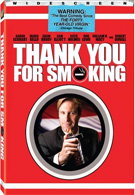It’s been a long standing fact that I have, on more than one occasion, argued that there are only two food groups - meats and sweets. Obviously, it was an uphill battle all the way, but we all have been the underdog in an argument at one point or another. Perhaps that’s why Thank You for Smoking succeeds, we always root for the underdog overcoming ridiculous odds. In this case, the underdog is pushing for more people to start smoking at least two packs a day. As Nick Naylor, lobbyist for corporate tobacco and Thank You for Smoking's protagonist, eloquently says, “If you argue correctly, you are never wrong.” Although you may be right, it might mean that you are also immoral, unemotional and inhuman. However, Thank You for Smoking is not a cautionary tale of morality, a pilgrimage for Naylor’s moral catharsis or a campaign against tobacco. It’s merely a witty script wrapped in slick cinematic style meant to be a solid piece of entertainment, showcase the directorial talent of Jason Reitman and pay the mortgage.
It may seem that Thank You for Smoking missed its chance at being an incredible satire with the audacity to take aim at the tobacco companies, or those who oppose them, with its tongue firmly planted in its cheek. The film, instead, saves us from slanted political views and endless preaching. Infamous health risks and anti-smoking campaigns are not the focus of the film, but are the MacGuffin that allows Naylor to exploit his spinster skills. And while the rest of the world hates Naylor, we like and sympathize with him. Through Arron Eckhart’s performance of Naylor, we see a charismatic, hard working father who values his relationship with his son. It just so happens, that Naylor peddles a product that kills a massive amount of people a year.
While Naylor’s dialogue dazzles us, Reitman, like any good cinematic magician, treats us to a stylistic lightshow to distract us from the fact that the film, while billed as a satire, isn’t necessarily taking a stand on any argument. Icons appear over the character’s heads like in an episode of the Road Runner and Wile E. Coyote and quick cuts and transitions keep the film moving at a brisk pace, but the film never presents a topic of discussion - which is odd given its controversial subject matter. It ends the same way it closes, with Naylor doing his job to pay the bills.
Like Naylor’s arguments, Reitman’s film is an entertaining display of passion and talent, yet what he is actually saying is empty and meaningless. Reitman side-stepped taking a position on tobacco to get a laugh, and he made the right decision. By not making an argument, Reitman is free to focus on his characters and presentation, which he masterfully executes. Thank You for Smoking, thankfully, is not a film that any political group will rally behind, but it is a film that those looking for a clever, light-weight satire should lobby for when voting on a movie at the video store. Thank You for Smoking is presented in beautiful 2.40 : 1 anamorphic widescreen that will strengthen your resolve for not hopping on the HD bandwagon. The audio, however, is the standard Dolby Digital 5.1 track that does an adequate job of dialogue and music, but fails to impress. Though with dialogue driven films, the biggest battle is usually trying to hear the actors over the ambient noise or music - that’s not a problem with this disc.
In the way of special features, you get not one, but two audio commentaries. On the first, Reitman holds his own as he tends to discuss the more technical production aspects. The second commentary also features Reitman, but he is joined by Ekhart and David Koechnes. If you only have the time for one of these commentaries, the second one is by far more interesting and you get most of the same info from Reitman as you do on the first track.
As usual, the 13 minutes of deleted scenes were deleted for a reason. While mildly funny, they would do nothing but get in the way of the film’s brisk plot. If anything, these 13 minutes show that Reitman knows when to make a cut when he should, regardless of how much he enjoys the scene.
Apart from that you get a dry segment from “The Charlie Rose Show,” two brief featurettes, which aren’t worth your collective 15 minutes, art and storyboard galleries, trailer and a plug for the soundtrack.
Your Daily Blend of Entertainment News
(On a side note: Please ignore that 40 year-old Virgin comparison on the front of the DVD box. There really is no reason to compare these two films.)

